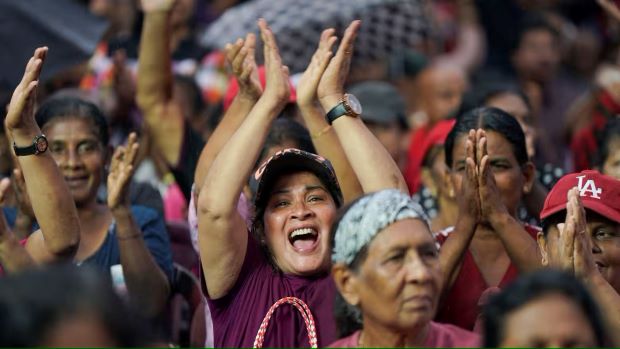Dissanayake’s bloc seen gaining control of Sri Lankan parliament
By Munza Mushtaq
COLOMBO — President Anura Kumara Dissanayake’s National People’s Power (NPP) is expected to win control of Sri Lanka’s parliament in the Nov. 14 election, completing a change of guard from an elite that has presided over the country’s politics for decades.
The NPP alliance is seen winning at least 113 of the 225 seats up for grabs from its current meagre three, after registration for candidates closed in mid-October.
The ruling Sri Lanka Podujana Peramuna (SLPP) party, controlled by the Rajapaksa family that has dominated politics, is likely to fall to third or even fourth place. Before the dissolution of parliament, SLPP held 145 seats, while the main opposition Samagi Jana Balawegaya coalition (SJB) controlled 54.
At least 30 long-serving and once-popular SLPP legislators have opted out of the race this time, expecting to lose.
“My guess is that the NPP might secure around 125 seats, which would constitute a comfortable majority,” said Jayadeva Uyangoda, a political science professor at the University of Colombo. “Even if it is 125, it indicates a paradigm shift in Sri Lanka’s party politics.”
The leftist anti-establishment Dissanayake won the presidential election in September with 42.3% of the vote. Sri Lankans ousted President Gotabaya Rajapaksa in July 2022 after the economy tipped into its worst crisis under his watch. Ranil Wickremesinghe, who had been appointed prime minister only two months earlier, took over as interim president.
Dissanayake dissolved parliament soon after his win and called for elections to consolidate power so that he could enact crucial laws. Many voted for him because of his commitment to tackling corruption, reviving the economy and improving transparency in government.
He also plans to renegotiate with the International Monetary Fund (IMF), looking to ease austerity measures imposed on Sri Lankans in exchange for a bailout loan after the country declared bankruptcy in 2022.
Chathuranga Abeysinghe, a data science consultant and first-time NPP parliamentary candidate, said that the presidential win, “despite being marred by misinformation and fake campaigns against us,” bodes well for the party.
“We are confident that we can achieve a majority of around 130 seats in the November election,” he said.
Candidates have yet to unveil concrete policies, and no election polling is available. But Colombo-based citizen activist Chaminda Dias said it is critical that politicians address corruption, economic mismanagement and failing public services.
“For far too long, Sri Lanka has been a country of crimes without criminals, and this needs to change,” Dias said. “The lack of accountability has fostered a culture of impunity, allowing those in power to feel immune to consequences.”
Many of Sri Lanka’s former leaders have been accused of corruption. Sri Lanka’s Supreme Court ruled late last year that Gotabaya and Mahinda Rajapaksa were among 13 former leaders responsible for economic mismanagement that led to the 2022 crisis.
The once-powerful former President Mahinda Rajapaksa, credited with quelling the 26-year civil war in 2009, is not contesting in this election. Mahinda is the older brother of Gotabaya, who fled the government in disgrace.
Mahinda’s eldest son, Namal, is also not contesting the seat he once held. But he hopes that a local quirk of the system could let him be appointed to parliament if his party wins enough seats in his district.
Those running this time, though, believe that Sri Lankans want change.
“The message is clear: The old way of governance will not be accepted,” said Swasthika Arulingam, a rights activist running for the first time as a candidate of the newly launched People’s Struggle Alliance.
Arulingam continued: “President Dissanayake and the new parliament must choose to govern differently. Policies and laws that favoured the elite — whether business or political — at the expense of millions are no longer tolerated.”
Addressing a rally last week, Dissanayake urged the public to use their vote to get rid of corrupt politicians.
“Some have already stepped aside voluntarily,” he said. “But if we truly want to clean up this parliament, we must fill it with people of integrity and dedication to building Sri Lanka.”
– asia.nikkei.com



Comments are closed, but trackbacks and pingbacks are open.